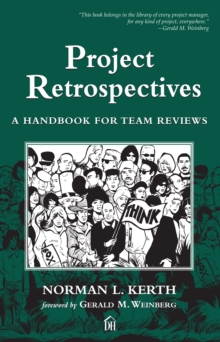
Complete Systems Analysis : The Workbook, the Textbook, the Answers EPUB
by James Robertson, Suzanne Robertson
Part of the Dorset House eBooks series
EPUB
Description
This is the digital version of the printed book (Copyright (c) 1998, 1994).
In a fundamentally new approach, Complete Systems Analysis teaches everything you need to know about analyzing systems: the methods, the models, the techniques, and more.
A definitive text on modern systems analysis techniques is combined with an extensive case study to give readers hands-on experience in completing an actual analysis project.
Readers proceed through each step of a full-scale analysis project, analyzing the complex requirements of a television station's airtime programming department. Each phase of the case study and each exercise in the textbook section is thoroughly explained in separate review and answer sections.
An innovative Trail Guide system-inspired by the difficulty levels marked on ski trails-encourages readers to follow a sequence that suits their skill level. Beginners follow the full trail while experienced analysts fill in gaps in their training, refresh their understanding of key concepts, and practice their skills. Managers review key concepts but can skip the detailed work with models.
The book shows how analysis is used for object-oriented implementation, and how event-response data flow models and entity-relationship data models are complementary, not competing, models.
Complete Systems Analysis adapts to the reader's needs and provides an appropriate learning path for the beginner, with a more direct route for experienced analysts wanting to make better use of today's techniques. Since its initial publication in 1994 as a two-volume set in hardcover, this highly acclaimed text-released in 1998 as a single, softcover volume-has served as a course text in classes throughout the world.
Topics include
- Analysis Models
- Data Flow Diagrams
- Data Viewpoint
- Data Models
- Leveled Data Flow Diagrams
- Current Physical Viewpoint
- Building the Data Dictionary
- Strategy: Focusing on the Essentials
- Identifying Events
- Modeling an Event Response
- Writing Mini Specifications
- CRUD Check
- Modeling New Requirements
- New Physical Viewpoint
- Object-Oriented Viewpoint
- Strategy: Toward Implementation
Information
-
Download - Immediately Available
- Format:EPUB
- Publisher:Pearson Education
- Publication Date:15/07/2013
- Category:
- ISBN:9780133492293
Other Formats
- PDF from £6.33
Information
-
Download - Immediately Available
- Format:EPUB
- Publisher:Pearson Education
- Publication Date:15/07/2013
- Category:
- ISBN:9780133492293










